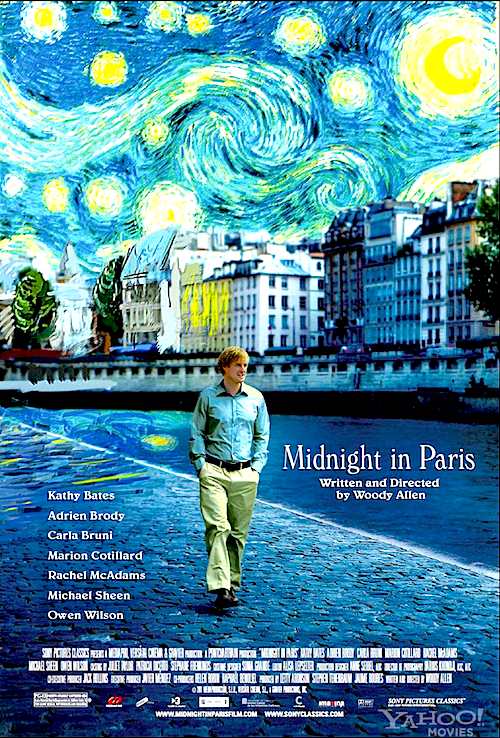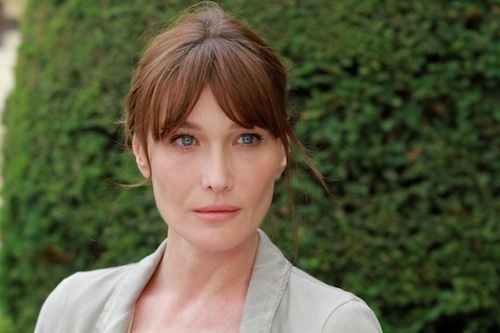 By Patricia Ducey. Midnight in Paris, Woody Allen’s latest film, is a frothy romantic comedy topped with a healthy soupcon of wisdom, a welcome turn from the now 75-year-old filmmaker.
By Patricia Ducey. Midnight in Paris, Woody Allen’s latest film, is a frothy romantic comedy topped with a healthy soupcon of wisdom, a welcome turn from the now 75-year-old filmmaker.
Screenwriter Gil (Owen Wilson) and his fiancée Inez (Rachel McAdams) accompany her well-heeled parents to Paris for a little pre-wedding vacation/shopping trip. Gil adores Paris and longs to leave L.A. behind to write novels there, a la Hemingway and Fitzgerald, in the heady Paris of his imagination; Inez, however, is quite content with the good life in a Malibu manse, financed by Gil’s steady income from what he derides as his B-movie success. (Mon dieu, what present day scribe would complain of steady sales of any scripts?!)
But Gil is an incurable romantic, and his longings create a pebble in the shoe of their relationship. He stalks off one night after a squabble to ponder his future, both literary and romantic. As the bell tower chimes midnight, an antique auto pulls up and the revelers inside drag him inside. As the night and the champagne flow, Gil comes to believe his hosts really are Zelda and Scott Fitzgerald, as they insist, and that he has landed somewhere inside his most cherished dream. And so his adventure ensues, with Gil concocting ever greater ruses to escape Inez to return to the ‘20s, where all his literary and artistic idols—and one particularly lovely woman—await him. But I will not spoil the fun by explaining; the story is very clever and surprising.
Some of Allen’s arch improv-style patter falls flat, but more of it produces smiles or laughter. And Paris is a character here, too; Allen and his cinematographer, Darius Khondji, weave a Paris of amber glowing streetlamps, sumptuous five-star restaurants and earthy flea markets for our delight. The city (at least the part in frame) looks perfectly lovely. He sets the action against a soundtrack of lively Cole Porter and many of his other jazz favorites perfect for the time. If you can’t afford a plane ticket, Midnight in Paris will do.
Corey Stoll as Ernest Hemingway fares the best among the 1920’s artist cameos; his crisp, uber-masculine dialogue is a delightful send-up of all the bad Hemingway imitators we’ve ever read. He and Kathy Bates as Gertrude Stein have much to do to move the plot along, but the appearances of Salvador Dali and Man Ray, however amusing, seem more like stops on a tour than part of the story.

Allen does have Gil deliver one rant against Republicans, the Tea Party, etc., directed against Inez’s parents—but, hilariously, Gil delivers this diatribe whilst chowing down on the foie gras and slurping the fine wine that those dastardly folks paid for! Unintentional or not, it’s a very funny, ironic twist.
In the end, Midnight in Paris is a cautionary tale about nostalgia and the futility of wallowing in one’s regrets. Answering that siren call can leave one adrift, lost in the ether of the past. Let us be frank: even Paris’ image as Most Romantic City in the World has been running on fumes for a while now. Yes, the remaining Belle Epoque Paris is lovely, the style and the cuisine divine – but outside of a few fashionable arrondissements, Paris is still a bustling modern city, chock-a-block with traffic, restive youth, and all manner of urban ills.
To his credit, Allen displays not one whit of self-congratulation or self-defense as he has in previous films, but rather seems at peace with a few demons. His Midnight in Paris provides plenty of refreshing laughter, and insight as well. Grab life and love while you can, he tells us, for life is more than a dream.
Posted on June 27th, 2011 at 4:00pm.
It’s a beautiful poster. Wish I had it as a painting (minus Owen Wilson, of course).
Just book a flight to NYC and stop by the MOMA, hee hee.
Oh, iIs that a famous painting? Shows what I know.
Yes, the poster is very Van Gogh. There’s always photoshop…
Love it.
The background of the poster is Van Gogh’s “The Starry NIght” on display at the Museum of Modern Art, MOMA for us native NYers, in NYC. Being raised in the NY metro area I had a chance to see it.
“Unintentional or not, it’s a very funny, ironic twist.”
Allen’s always been good at undercutting his jabs at the right with simultaneous jabs at the left. Remember the bit in ‘Everyone Says I Love You’ where it turns out the son only started espousing conservatism because of a brain injury? Remember Alan Alda’s liberal dad and his look of absurd relief, of absolute glee, when he finds out about the brain injury? That’s funny to both sides.